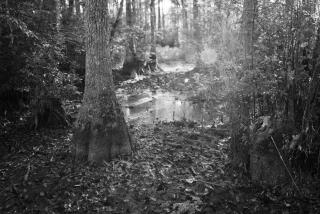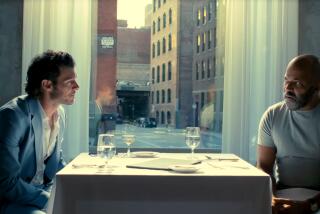He Did Not Tarry in His Crossings : THOMAS JEFFERSON: A Life, <i> By Willard Sterne Randall (Henry Holt: $35; 675 pp.)</i>
- Share via
Theoreticians of biography would have it otherwise, but readers are drawn to the genre by the same pleasurable force that pulls zoo-goers to the monkey house: a desire for the connectedness that comes from recognizing parts of oneself in the lives of others.
The life of Thomas Jefferson invites us to connect with our ideals. It was Jefferson, in the Declaration of Independence, who gave Americans the noblest tenets of their political creed: All men are created equal. Government’s power derives solely from the consent of the governed. Human beings have unalienable rights to life, liberty and--how extravagant and strange, when you think about it--the pursuit of happiness.
It is thrilling to keep company, even vicariously, with a man who would think to say that one should not take pride in one’s character except when it is used to disarm “the efforts of malice.” He had a capacious faith in the collective wisdom of his fellow citizens. Convinced that they were the only reliable bulwark against political tyranny, Jefferson believed they would do the right thing as long as they were well informed. As Jefferson saw it, the prime duties of a democratic leader were to “inform the minds of the people, and to follow their will.”
Few figures in American life have resumes as impressive and varied as Jefferson’s. Besides writing the Declaration of Independence, he led the crusade that culminated in the separation of church and state, crushed a budding aristocracy, championed individual rights and a free press and public education, was secretary of state and minister to France as well as vice president and President, more than doubled the size of the nation through the Louisiana Purchase (at the bargain price of 4 cents an acre), founded the University of Virginia, proved himself an inspired architect there and at Monticello, authored the parliamentary rules still used by the Senate and sent Lewis and Clark off on their great expedition.
Most of this catalogue is so familiar that a reader (this reader, anyway) turns to a biography of Jefferson less curious about what he did than why he did it, and what kind of person he was. But in “Thomas Jefferson: A Life,” Willard Sterne Randall appears to have set himself the more basic task of showing the man in action.
To a point, Randall’s approach serves his subject well because Jefferson was no Hamlet, paralyzed by indecision. In most of his life the bridge between his thoughts and deeds was short, and he did not tarry in his crossings.
As a young lawyer he handled as many as 500 cases a year. As a revolutionary he poured his brilliance and ardor into writings that did much to transform the idea of American independence from heresy to hallowed cause. As a fervent egalitarian he channeled his distrust of power and wealth into an attack on Virginia’s primogeniture laws, which fostered inequality by restricting the inheritance of land. Jefferson devoted more than 60 of his 83 years to public service, and during his spare time, he rarely stopped to lean on his shovel. There were houses to build, gardens to landscape, wilds to explore, a vast correspondence to keep up and a large plantation to run.
Where the biographer of Benjamin Franklin could drown in the abundance of stories he tells on himself, the biographer of Jefferson toils in a desert. Widowed at 39 after 11 happy years of marriage, Jefferson also suffered the early loss of other treasured companions, but his griefs go largely unmentioned in his letters. And for a man who crafted some of the most memorable lines in the English language, he was surprisingly ham-handed at turning a witty phrase.
Randall adds what flesh he can to this bony spirit, succeeding best in his accounts of Jefferson’s relationships with his wife, his daughter and Maria Cosway, an artist’s wife with whom Jefferson fell in love in Paris. Although Jefferson does flicker to life in these episodes, one senses that he would never be hit by a heat-seeking missile. Of his plans for educating his daughter, Patsy, Jefferson wrote, “The chance that in marriage she will draw a blockhead I calculate at about 14 to 1, and of course (conclude) that the education of her family will probably rest on her own ideas and direction without assistance. With the best poets and prose writers, I shall therefore combine a certain extent of reading in the graver sciences.” Randall adds that Patsy was 11 at the time and that her father hoped she would soon read Don Quixote.
On the subject of Jefferson the slaveholder, the most troubling part of the man for modern readers, Randall declines to side either with those who stress Jefferson’s opposition to slavery or those who say his shining words can never outweigh the ignobility of owning slaves. Randall is content to register Jefferson’s ambivalence, at one moment quoting his passionate warning against the peculiar institution (‘I tremble for my country when I reflect that God is just”) and at the next showing this master of more than 200 slaves placing a newspaper advertisement in hopes of recovering one who had run away.
Randall offers little analysis of Jefferson’ antislavery arguments, which is a loss, because they are not nearly so progressive and humane as their defenders have made them out to be. They are, in fact, stunning in their coldness. At times Jefferson expressed more worry about the insalubrious effects of slavery on white morals than on the lives of those in bondage. He also tended to see slavery more as an affront to God than to slaves. He found it easier to blame the continuation of the practice on the greed of George III than to admit the greed of Southern planters. Though he insisted upon the equality of all men, he regarded slaves as inferior (and had to, as historian Gordon S. Wood has noted, in order to justify his own way of life). Jefferson believed that freedom, if it came, should be followed by deportation to prevent revenge and miscegenation.
Randall’s decision to let most of his narrative proceed with a minimum of interpretation leaves a reader (this one, anyway) longing for a depth to match the scope of the subject. Much is told, but little accretes. Randall notes, for example, that Jefferson greatly admired Jesus and was “thoroughly conversant” with the literature of the Enlightenment. We learn virtually nothing, however, of how these influences shaped his life. Likewise, Randall mentions Jefferson’s conviction that government had no right to take on debts that would have to be repaid by future generations, but there is no discussion of what, if anything, he tried to make of this idea. The facts of Jefferson’s life are here. The life of the facts remains an enigma.
More to Read
Sign up for our Book Club newsletter
Get the latest news, events and more from the Los Angeles Times Book Club, and help us get L.A. reading and talking.
You may occasionally receive promotional content from the Los Angeles Times.








